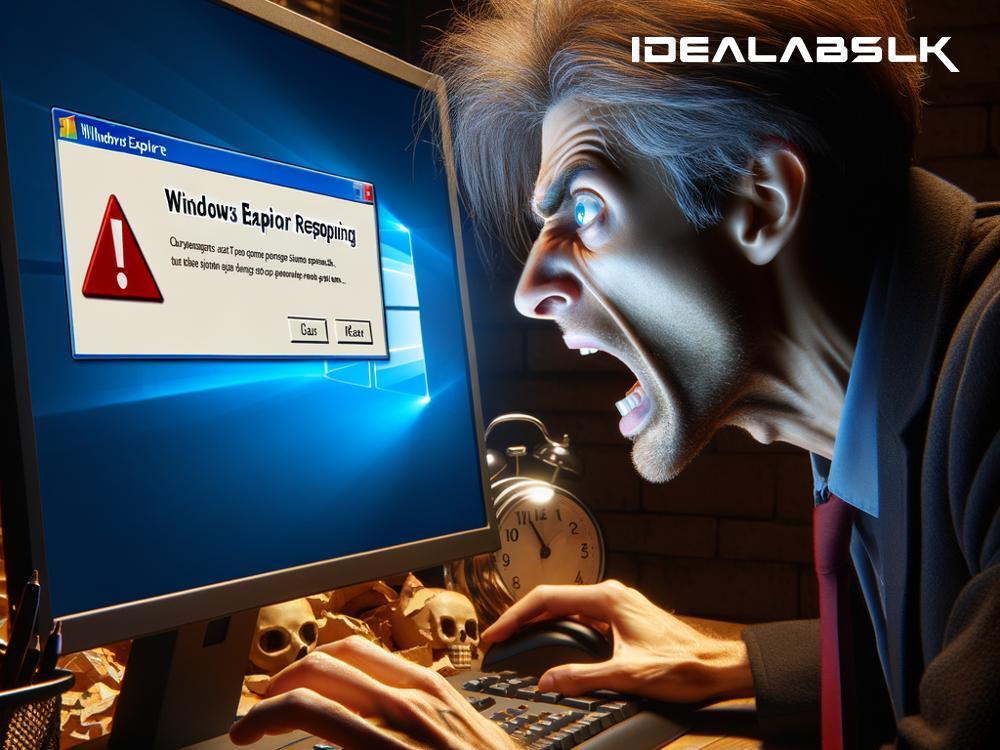How to Fix 'Windows Explorer Not Responding' Error
Have you ever come across a frustrating moment when your computer seems to halt to a stop, specifically when you're trying to access your files through Windows Explorer? The message 'Windows Explorer Not Responding' pops up, and suddenly, it feels like you're stuck in digital quicksand. Don't worry! This guide will walk you through several simple steps to get your digital buddy back on its feet.
Understanding the Culprit:
First off, it's essential to grasp what Windows Explorer is. It's not just the tool that helps you find your files; it's the backbone of your Windows interface— the taskbar, the desktop, and the Start menu, all rely on it. So, when it starts acting up, it feels like your entire system is on the fritz.
Why Does It Happen?
Several things can cause Windows Explorer to stop responding, ranging from corrupt files, an overloaded system, outdated drivers, to conflicts with other software.
But let's not dwell on the problem. You're here for solutions, and that's exactly what we're diving into next.
Step-by-Step Solutions:
1. Restart Windows Explorer:
This is the go-to quick fix:
- Press Ctrl + Shift + Esc to open the Task Manager.
- Find Windows Explorer on the list, right-click, and select Restart.
This can often kick-start Windows Explorer back to normal function without further action needed.
2. Clear File Explorer History:
Sometimes, the history cache can get overloaded and cause issues.
- Open any folder and click on View at the top, then Options > Change folder and search options.
- Go to the General tab, and under Privacy, click on Clear to clear File Explorer history.
3. Run a System File Check:
Windows has a built-in tool to check for and repair corrupt system files.
- Open Command Prompt as administrator by right-clicking on the Start menu, selecting Command Prompt (Admin), or Windows PowerShell (Admin).
- Type
sfc /scannowand hit Enter. This starts the system file checker process, which will fix any corrupted files it finds.
4. Check for Updates:
An outdated system can lead to all sorts of issues, including this one.
- Go to Settings > Update & Security > Windows Update, and click Check for updates.
Keeping your system up-to-date ensures you're not missing any critical fixes or improvements.
5. Run Disk Cleanup:
A cluttered system can often lead to operational issues.
- Type Disk Cleanup in the Windows search bar and open the tool.
- Select the drive you want to clean (usually C:), and check the files you wish to delete, including system files which can contain outdated or temporary files causing issues.
6. Update Drivers:
Outdated or corrupt drivers, especially graphics drivers, can cause Explorer to stop responding.
- Go to Device Manager, find your graphics card under Display adapters, right-click, and select Update driver.
- Choose Search automatically for updated driver software and follow the prompts.
7. Perform a Clean Boot:
This helps identify if background applications are causing the issue.
- Type msconfig in the Windows search bar and select System Configuration.
- Go to the Services tab, check Hide all Microsoft services, and then Disable all.
- Switch to the Startup tab, open Task Manager, and disable all startup items. Restart your computer.
This boots your PC with minimal programs and can help you pinpoint the culprit if Windows Explorer runs smoothly after a clean boot.
8. Check for Malware:
Malware can often cause your system to hang. Running a thorough scan using Windows Defender or a trusted third-party antivirus can help eliminate any security threats.
When All Else Fails:
If you've tried everything and nothing works, you might need to consider more drastic measures like restoring your system to a previous state using System Restore or even resetting your PC. These options can help get things back to normal but can also mean a loss of data, so they should be last resorts.
Wrapping It Up:
Facing a 'Windows Explorer Not Responding' error can be a test of patience, but it's often something you can fix with a bit of time and the right steps. Remember, keeping your system clean, updated, and malware-free goes a long way in preventing these issues. Hopefully, this guide has helped you resolve the problem and made your digital life a bit smoother. Happy computing!

